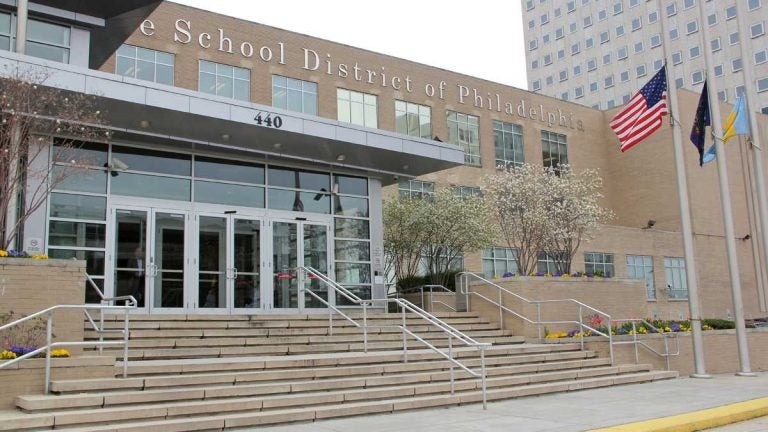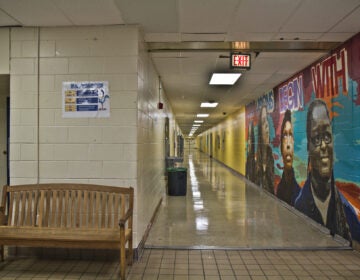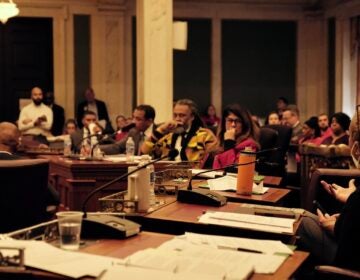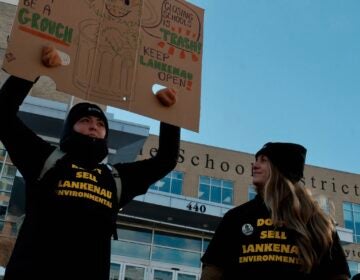Philly school asbestos inspection vote delayed to add lead paint checks
A City Council member has delayed a scheduled vote on a bill to require more asbestos inspections in Philly schools. He wants to add rules around lead paint.

Philadelphia School District headquarters (Emma Lee/WHYY)
After repeated revelations of asbestos hazards in Philadelphia public schools, City Council will likely consider requiring additional inspections for the cancer-causing material.
But not yet. The bill was expected to come to a vote Thursday — but its sponsor, At-large City Councilmember Derek Green, plans to hold it in order to make an amendment that would strengthen enforcement around lead paint, as well. He hopes to bring that version to a vote by the end of the month.
“Having schools that are in the best condition to enable our children to learn is something that’s important to improve the quality of education in the city of Philadelphia,” Green said. His son is a student in a school where unsafe asbestos has been found, he said, and his mother taught in the School District of Philadelphia for decades — part of that time in a building with asbestos issues.
Green’s bill, in its current form, would add asbestos to the yearly inspections required for publicly funded educational buildings in the city to be certified for occupancy. He plans to introduce an amendment April 21 that would strengthen city involvement in certifications around lead paint as well.
A council committee voted unanimously to advance an earlier version of the legislation in November. The school district opposes it.
Damaged asbestos-containing materials, which can cause lung damage and cancer, have been found in numerous Philly public schools. The district agreed to pay hundreds of thousands of dollars to a former teacher diagnosed with deadly mesothelioma after working in the district for close to 30 years. The Environmental Protection Agency even fined the district in the 1980s for failing to properly warn families about asbestos hazards in two schools.
“This is an issue that has not been addressed at the level it should be because it’s been an ongoing, persistent issue,” Green said. “I have taken the perspective that the city should take a more active role in addressing this issue.”
Currently, the School District of Philadelphia conducts surveillance inspections of asbestos-containing materials in its buildings every six months and comprehensive inspections every three years, in compliance with federal law, and posts reports on its website. In addition, city inspectors look for unsafe asbestos conditions before and after construction work affecting known asbestos-containing material, or in response to complaints.
But under Green’s bill, the city Health Department or a testing agency certified by the Pennsylvania Department of Labor and Industry would inspect school buildings each year for unsafe asbestos conditions — alongside the inspections already required for factors such as fire safety and water quality.
The bill would also require inspection results to be posted to a publicly accessible website.
“The district has not been able to manage the problems over the years, and so I think that the legislation is going to really help support making sure that schools are safe places for children to learn and for educators to work,” said Jerry Jordan, president of the Philadelphia Federation of Teachers.
Jordan said the District’s current inspection schedule for asbestos is too infrequent.
“Today you can have an inspection that is required by the government and, you know, two weeks from now there could be exposed asbestos because of the age of the buildings and the lack of maintenance,” he said.
School district leaders are against the idea of additional inspection requirements. They argue asbestos and lead paint are already tightly regulated — and that Green’s bill would only complicate things and make compliance harder. They also take issue with an advisory body the bill would create, to include parents, students, and union representatives, alongside district officials.
“[The bill] relies upon undefined ‘best practices’ to be supervised by an advisory board of non-experts that would put the District in direct conflict with the federal law governing asbestos management for buildings in every school district in the nation,” said school district spokesperson Christina Clark, in an emailed statement.
“We want to continue to work with city leaders toward solutions that will help us achieve our shared goals of maintaining healthy, safe environments for all students and staff,” she wrote. “But this amended ordinance is not the right solution.”
An earlier version of Green’s legislation would have added mold to the inspection list as well, but Green removed this in an amendment introduced last week, because of mold’s ubiquity and the challenges of setting specific standards for it, he said.
If passed, the new asbestos inspection requirements would go into effect over the next three years, with one third of School District of Philadelphia-funded school buildings inspected after August 2023, one third after August 2024, and the last third after August 2025.

Subscribe to PlanPhilly
WHYY is your source for fact-based, in-depth journalism and information. As a nonprofit organization, we rely on financial support from readers like you. Please give today.










